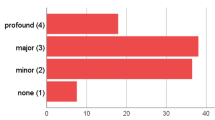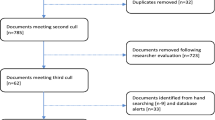Abstract
This study explored what was entailed in implementing a professional development (PD) designed in the United States (US) to a different, Israeli, context. To achieve this goal, the first step was empirically examining the effectiveness of such a PD using quantitative methods. We then examined which adaptations were made in the imported PD and at what level. Our study is based on data obtained from the Israeli TEAMS (Teaching Exploratively for All Mathematics Students) PD, which “imported” a US-based program based on “The Five Practices for Orchestrating Productive Discussions” and “Accountable Talk.” We build on studies of cultural adaptations of interventions which provide a framework whereby adaptations to a model can be made along three levels: philosophical, propositional, and procedural. To assess the effectiveness of the PD, we analyzed 211 recorded lessons. Individual growth curve analysis indicated significant growth in five parameters: intellectual authority, classroom discourse, exposure of student thinking, task enactment, and consolidation. These findings show that the PD was effective in importing several core practices which were relatively well defined. We use these quantitative findings, coupled with additional data obtained from the planning and execution of the PD, as a case to study the process of adapting an educational intervention to a new context. This analysis shows that our adaptations were mostly done at the procedural level. However, the quantitative results point to the possible necessity of also changing the propositional model of what intervention can work in a new context.



Similar content being viewed by others
Notes
We are risking oversimplification of CBT, which is a complex and diverse umbrella term for multiple types of treatments. For more on CBT, see Felgoise, Nezu, Nezu, and Reinecke (2005).
We are aware of Cohen’s Kappa being a more robust measure of inter-rater reliability. However, calculating Cohen’s Kappa on this set of coding, due to the multiple coders involved, proved to be extremely complex. In addition, as explained herein, the coding is highly inferential. Therefore, reliability was often supported by an additional judgment of the authors and/or by discussions between the group members. In such a high-inference setting, we chose to rely on percent of agreement to gain a general sense of the reliability of our coders.
From the collective experience of the four authors, as well as the 10 coders who worked with us on coding the videos, we know this structure is indeed the standard form of a mathematics lesson, at least in secondary schools in Israel.
References
Bar, H. (2017). Missing data - mechanisms and possible solutions. Culture and Education, 29(3), 492–525.
Bernal, G., & Adames, C. (2017). Cultural adaptations: Conceptual, ethical, contextual, and methodological issues for working with ethnocultural and majority-world populations. Prevention Science, 18(6), 681–688. https://doi.org/10.1007/s11121-017-0806-0
Blum-Kulka, S., Blondheim, M., & Hacohen, G. (2002). Traditions of dispute: From negotiations of talmudic texts to the arena of political discourse in the media. Journal of Pragmatics, 34(10–11), 1569–1594.
Boston, M. D. (2012). Assessing instructional quality in mathematics. The Elementary School Journal, 113(1), 76–104. https://doi.org/10.1086/666387
Boston, M. D., & Smith, M. S. (2009). Transforming secondary mathematics teaching: Increasing the cognitive demands of instructional tasks used in teachers’ classrooms. Journal for Research in Mathematics Education, 40(2), 119–156.
Boston, M. D., & Smith, M. S. (2011). A ‘task-centric approach’ to professional development: Enhancing and sustaining mathematics teachers’ ability to implement cognitively challenging mathematical tasks. ZDM, 43(6–7), 965–977.
Castro, F. G., & Yasui, M. (2017). Advances in EBI development for diverse populations: Towards a science of intervention adaptation. Prevention Science, 18(6), 623–629.
Charalambous, C. Y., & Hill, H. C. (2012). Teacher knowledge, curriculum materials, and quality of instruction: Unpacking a complex relationship. Journal of Curriculum Studies, 44(4), 443–466.
Cheung, D. (2008). Facilitating chemistry teachers to implement inquiry-based laboratory work. International Journal of Science and Mathematics Education, 6(1), 107–130. https://doi.org/10.1007/s10763-007-9102-y
Doig, B., & Groves, S. (2011). Japanese lesson study: Teacher professional development through communities of inquiry. Mathematics Teacher Education and Development, 13(1), 77–93.
Domenech Rodríguez, M. M., Baumann, A. A., & Schwartz, A. L. (2011). Cultural adaptation of an evidence based intervention: From theory to practice in a Latino/a community context. American Journal of Community Psychology, 47(1), 170–186. https://doi.org/10.1007/s10464-010-9371-4
Elliott, J. G. (2014). Lessons from abroad: Whatever happened to pedagogy? Comparative Education, 50(1), 27–44.
Felgoise, S., Nezu, A. M., Nezu, C. M., & Reinecke, M. A. (2005). Encyclopedia of cognitive behavior therapy. New York: Springer US.
Henningsen, M., & Stein, M. K. (1997). Mathematical tasks and student cognition: Classroom-based factors that support and inhibit high-level mathematical thinking and reasoning. Journal for Research in Mathematics Education, 28(5), 524–549.
Heyd-Metzuyanim, E. (2019). Changing teaching practices towards explorative mathematics instruction – The interweaving of teacher identity and pedagogical discourse. Teaching and Teacher Education, 86. https://doi.org/10.1016/j.tate.2019.06.016
Heyd-Metzuyanim, E., & Shabtay, G. (2019). Narratives of ‘good’ instruction: Teachers’ identities as drawing on exploration vs. acquisition pedagogical discourses. ZDM Mathematics Education, 51(3), 541–554. https://doi.org/10.1007/s11858-018-01019-3
Heyd-Metzuyanim, E., Smith, M., Bill, V., & Resnick, L. B. (2019). From ritual to explorative participation in discourse-rich instructional practices: A case study of teacher learning through professional development. Educational Studies in Mathematics, 101(2), 273–289. https://doi.org/10.1007/s10649-018-9849-9
Hiebert, J., & Grouws, D. A. (2007). The effects of classroom mathematics teaching on students’ learning. In F. Lester (Ed.), Second handbook of research on mathematics teaching and learning (pp. 371–404). Charlotte, NC: Information Age.
Hoffman, L. (2015). Longitudinal analysis: Modeling within-person fluctuation and change. New York: Routledge.
Jackson, K., Garrison, A., Wilson, J., Gibbons, L., & Shahan, E. (2013). Exploring relationships between setting up complex tasks and opportunities to learn in concluding whole-class discussions in middle-grades mathematics instruction. Journal for Research in Mathematics Education, 44(4), 646–682. https://doi.org/10.5951/jresematheduc.44.4.0646
Lasry, N., Charles, E., & Whittaker, C. (2014). When teacher-centered instructors are assigned to student-centered classrooms. Physical Review Special Topics - Physics Education Research, 10(1), 1–9. https://doi.org/10.1103/PhysRevSTPER.10.010116
Michaels, S., & O’Connor, C. (2015). Conceptualizing talk moves as tools: Professional development approaches for academically productive discussion. In L.B. Resnick, C. Asterhan, & S.N. Clarke (Eds.), Socializing intelligence through talk and dialogue (pp. 347–362). Washington, DC: American Educational Research Association. https://doi.org/10.3102/978-0-935302-43-1_27
Morrison, K. (2001). Randomised controlled trials for evidence-based education: Some problems in judging “what works”. Evaluation & Research in Education, 15(2), 69–83. https://doi.org/10.1080/09500790108666984
Munter, C., Stein, M. K., & Smith, M. S. (2015). Dialogic and direct instruction: Two distinct models of mathematics instruction and the debate(s) surrounding them. Teachers College Record, 117(11), 1–32.
Muthén, L. K., & Muthén, B. O. (2017). Mplus user’s guide (8th ed.). Los Angeles, CA: Muthén & Muthén.
National Council of Teachers of Mathematics (1989). Curriculum and evaluation standards for school mathematics. Reston, VA: Author.
National Council of Teachers of Mathematics (2014). Principles to actions: Ensuring mathematical success for all. Reston, VA: Author.
Ono, Y., & Ferreira, J. (2010). A case study of continuing teacher professional development through lesson study in South Africa. South African Journal of Education, 30(1), 59–74.
Quint, J. C., Akey, T. M., Rappaport, S., & Willner, C. J. (2007). Instructional leadership, teaching quality and student achievement suggestive evidence from three urban school districts. New York: MDRC. Retrieved June 17, 2020, from http://eric.ed.gov/?id=ED499788
Resnick, L. B., Asterhan, C. S. C., & Clarke, S. N. (2018). Accountable talk: Instructional dialogue that builds the mind. Educational practices series. International Academy of Education (IAE) and the International Bureau of Education (IBE). Retrieved July 31, 2020, https://unesdoc.unesco.org/ark:/48223/pf0000262675
Rigby, J. G., Larbi-Cherif, A., Rosenquist, B. A., Sharpe, C. J., Cobb, P., & Smith, T. (2017). Administrator observation and feedback: Does it lead toward improvement in inquiry-oriented math instruction? Educational Administration Quarterly, 53(3), 475–516. https://doi.org/10.1177/0013161X16687006
Rock, T. C., & Wilson, C. (2005). Improving teaching through lesson study. Teacher Education Quarterly, 32(1), 779–92.
Sawada, D., Piburn, M. D., Judson, E., Turley, J., Falconer, K., Beford, R., & Bloom, I. (2002). Measuring reform practices in science and mathematics classrooms: The reformed teaching observation protocol. School Science and Mathematics Journal, 102(6), 245–253. https://doi.org/10.1111/j.1949-8594.2002.tb17883.x
Schoenfeld, A. H. (2014). What makes for powerful classrooms, and how can we support teachers in creating them? A story of research and practice, productively intertwined. Educational Researcher, 43(8), 404–412.
Silver, E. A., & Lane, S. (1995). Can instructional reform in urban middle schools help students narrow the mathematics performance gap? Some evidence from the QUASAR Project. Research in Middle Level Education, 18(2), 49–70. https://doi.org/10.1080/10825541.1995.11670046
Singer, J. D., & Willett, J. B. (2003). Applied longitudinal data analysis: Modeling change and event occurrence. New York: Oxford University Press.
Slavin, R. E. (2002). Evidence-based education policies: Transforming educational practice and research. Educational Researcher, 31(7), 15–21.
Smith, M. S., & Stein, M. K. (2011). 5 practices for orchestrating productive mathematics discussions. Reston, VA: National Council of Teachers of Mathematics.
South African Department of Basic Education (DBE). (2011). Curriculum and assessment policy statement grades 1–3: Mathematics. Policy. Pretoria: DBE.
Stein, M. K., Correnti, R., Moore, D., Russell, J. L., & Kelly, K. (2017). Using theory and measurement to sharpen conceptualizations of mathematics teaching in the common core era. AERA Open, 3(1), 233285841668056.
Stein, M. K., Engle, R. A., Smith, M. S., & Hughes, E. K. (2008). Orchestrating productive mathematical discussions: Five practices for helping teachers move beyond show and tell. Mathematical Thinking and Learning, 10, 313–340.
Stein, M. K., Grover, B. W., & Henningsen, M. (1996). Building student capacity for mathematical thinking and reasoning: An analysis of mathematical tasks used in reform classrooms. American Educational Research Journal, 33(2), 455–488. https://doi.org/10.3102/00028312033002455
Stein, M. K., & Lane, S. (1996). Instructional tasks and the development of student capacity to think and reason: An analysis of the relationship between teaching and learning in a reform mathematics project. Educational Research and Evaluation, 2(1), 50–80. https://doi.org/10.1080/1380361960020103
Stein, M. K., & Smith, M. S. (1998). Mathematical tasks as a framework for reflection: From research to practice. Mathematics Teaching in the Middle School, 3(4), 268–275.
Sun, M., Wilhelm, A. G., Larson, C. J., & Frank, K. A. (2014). Exploring colleagues’ professional influence on mathematics teachers’ learning. Teachers College Record, 116(6), 1–30.
Walkowiak, T. A., Berry, R. Q., Meyer, J. P., Rimm-Kaufman, S. E., & Ottmar, E. R. (2014). Introducing an observational measure of standards-based mathematics teaching practices: Evidence of validity and score reliability. Educational Studies in Mathematics, 85(1), 109–128. https://doi.org/10.1007/s10649-013-9499-x
Weingarden, M., Heyd-Metzuyanim, E., & Nachlieli, T. (2019). The realization tree assessment tool – Examining explorative participation in mathematics lessons. The Journal of Mathematical Behavior, 56, 100717. https://doi.org/10.1016/j.jmathb.2019.100717
Yang, Y. (2016). Lessons learnt from contextualising a UK teaching thinking program in a conventional Chinese classroom. Thinking Skills and Creativity, 19, 198–209. https://doi.org/10.1016/j.tsc.2015.07.002
Acknowledgements
This research was supported by a grant from the Israeli Trump Foundation, no. 220. We wish to thank Mary Kay Stein and Richard Correnti for providing support at the initial stages of this study. We also thank Miriam Wallach for her feedback on earlier versions of this manuscript.
Author information
Authors and Affiliations
Corresponding author
Additional information
Publisher’s note
Springer Nature remains neutral with regard to jurisdictional claims in published maps and institutional affiliations.
Electronic supplementary material
ESM 1
(DOCX 25.8 kb)
Rights and permissions
About this article
Cite this article
Heyd-Metzuyanim, E., Nachlieli, T., Weingarden, M. et al. Adapting a professional development program for cognitively demanding instruction across shifting contexts. Educ Stud Math 104, 385–403 (2020). https://doi.org/10.1007/s10649-020-09967-y
Published:
Issue Date:
DOI: https://doi.org/10.1007/s10649-020-09967-y




